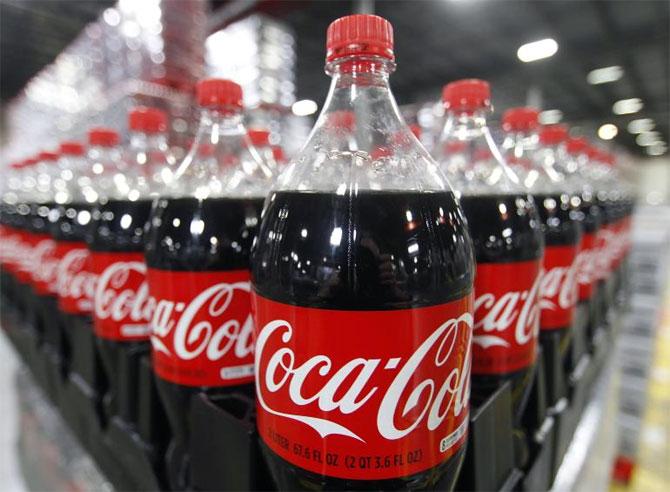 | « Back to article | Print this article |

Creating compelling stories defines the company's current advertising and marketing strategy; a master at the art of plugging brands, albeit subtly
Twenty years ago, Coca-Cola, the world’s largest beverage maker, redefined how in-film placements happened in India, a key market for the company and one where movies are akin to religion in their appeal.
A successful Bollywood foray led it into more experimental forms of storytelling; Coke Studio in 2011 and more recently a ‘happiness campaign’ for schools. And with this the brand enters a new phase, weaving new stories for new consumers.
The MTV-Coke partnership has spawned similar tie-ups as brands have looked for ways to get inside their customers’ lives.
One such being rival Pepsi’s tie-up with MTV for an Indie music channel called Pepsi MTV Indies last year. Recently, Nestle’s coffee brand Nescafe tied up with MTV to launch a co-branded initiative called MTV Presents Nescafé Labs -- a platform for experimental and creative talent and it is a digital-only property.
And of course, there are the in-film placements that have become an indispensable part of movie promotions and corporate marketing strategies.
Coke integrated itself into the storyline of the Subhash-Ghai-directed Hindi movie Taal (1999), sparking off a trend of brand associations with films.
This was a break from the otherwise common practice of blatantly promoting brands within movies.
Even after two decades, the Coke-in-Taal in-film placement, say experts, continues to be recalled as a pioneering effort.
The Coke strategy has been to be a part of powerful stories, meaningfully; its brand being a ubiquitous presence, but never an eyesore.
This was the thinking behind its high-decibel cola campaigns on television, as well as its popular platform for non-film music, Coke Studio which it brought into India a few years ago, with MTV as its partner.
The franchise has gone beyond the confines of a studio, quite literally, into live shows and concerts.
Turning the wheel
Coke is changing its brand language yet again.
This time the emphasis is on what Coca-Cola’s India and South West Asia President Venkatesh Kini says is 'creating compelling stories'.
This is taking various forms. Like Coke’s tie-up with NDTV for the ‘Support My School’ initiative that focuses on creating ‘happy schools’ by improving sanitation and other basic facilities. T
he motive of this exercise, explains Kini, is tied to Coke’s overall ‘Open Happiness’ campaign, which is the platform on which the brand is predicated.
The Atlanta-based major has done a number of things in recent years to promote ‘Open Happiness’.
It has applied this to vending machines, a common mode through which consumers abroad buy Coke.
Coca-Cola has distributed cakes, flowers and prizes through ‘Happiness Machines’ and its campaign titled ‘Where will Happiness Strike Next’ is expected to be scaled up to many more markets in the coming years, the company says.
Its ‘Sharing a Coke’ campaign was launched in Australia a few years ago and is now in over 80 countries worldwide. Under this initiative Coke bottles are personalised with some common names being printed on the labels of its PET bottles.
For example, if you live in the UK or USA, there are bottles with names such as Peter, James, John, Margaret, Elizabeth, Kate etc printed on Coke bottles.
Consumers can easily pick these up as gifts.
The ‘Share a Coke’ campaign has been very popular on social media and has helped Coca-Cola lift flagging sales in markets such as the US.
Encouraged by the response, the company is investing even more in the campaign and is allowing consumers to order personalised bottles on a dedicated website.
Doing good is good marketing
In India Coca-Cola is using the CSR route to promote its brands, also fulfilling its social duties in the process.
Thums-Up, its largest cola brand in the country, has tied up with brand ambassador Salman Khan’s Being Human Foundation to “unleash the thunder within people”, the company says.
Incidentally, Coca-Cola is not the only brand speaking this new consumer language. In recent years, most big advertisers from Unilever to Dettol are getting a social sub-text into their communication.
For instance, Unilever is pushing the importance of hand-washing using Lifebuoy as a vehicle to achieve it.
The company has also committed to building toilets in rural India using toilet cleaner Domex under an initiative called the Domex Toilet Academy.
Unilever’s global CEO Paul Polman recently said its “brands with purpose” were growing at twice the speed of regular brands in its portfolio, contributing to half of the firm’s overall business growth.
Rival RB, the British consumer goods major, is leveraging the Swachh Bharat campaign to not only help inculcate good hygiene habits among Indians, but also improve its consumer base both in rural and urban India.
Besides launching a five-year hygiene programme last year, it has helped build a detailed hygiene curriculum for kids, identified 200 villages in Uttar Pradesh and Bihar where it wants to end open-defecation and has also helped raise awareness and money for the cause, RB’s regional director for South Asia, Nitish Kapoor said.
To some extent the move to speak up on social and humanitarian causes is the result of new provisions in the Companies Act which now mandates firms to invest two per cent of their profits in CSR.
But as companies see it paying off, this fusion of brand and social communication will only increase, experts said.
Coke should get ready for some serious competition.
Photograph: Reuters